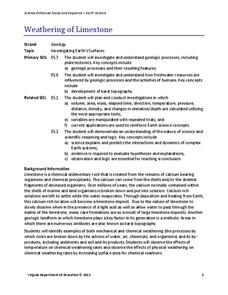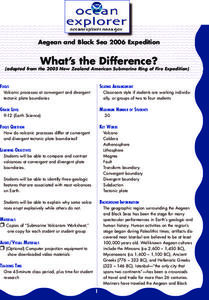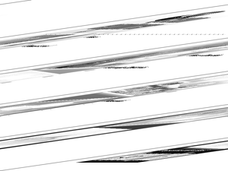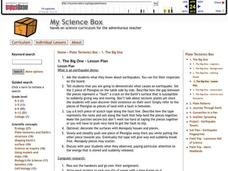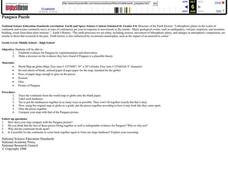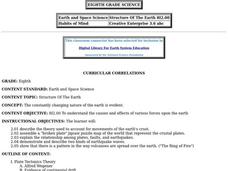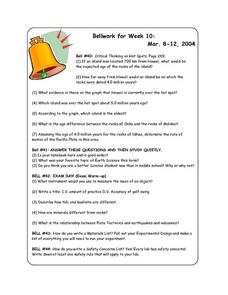Curated OER
8th GRade SCience End of the Year Flip Video Review
Students explore video taping. In this science review lesson, students create a video of an assigned science unit as a peer study tool.
National Science Teachers Association
Adopt-a-Dino
Earth historians research a specific dinosaur, write a paper about the Mesozoic era that it lived in, create an artistic rendition of the environment, and give a presentation in class about what they learned. Be aware that there are...
Curated OER
Science NetLinks: Fossils and Geologic Time
Students investigate the development of the geologic time scale. Also, to introduce them to the major time periods in earth's history, as well as to the role fossils play in helping us understand this history.
Curated OER
Evolution and Geological Time
In this evolution worksheet, students review the geological time scale and how evolution has taken place over time. This worksheet has 13 fill in the blank questions.
Virginia Department of Education
Weathering of Limestone
We all know limestone weathers, but what affects the rate of weathering? Young scientists investigate the physical and chemical weathering of limestone (chalk) through experimentation. First, they conduct trials with different-size...
Curated OER
What's the Difference?
High schoolers investigate volcanic processes at convergent and divergent
tectonic plate boundaries. They read and analyze diagrams, complete a worksheet, and write an essay.
Curated OER
Earthquake Experiments
Young scholars discuss the effects of earthquakes. For this earth science lesson, students create earthquake models and earthquake-proof buildings. They construct their own seismograph.
Curated OER
Cruising the Mantle
Young scholars explore the plate boundaries of the earth. Through the use of video, internet and hands-on activities, students examine the types of plate boundaries. They create a model to illustrate the movement and interaction of the...
Curated OER
Reduced Fare
Students discover the relationship between tectonic plate boundaries and the communities of life that thrive at such boundaries. In this biology lesson, students find that methane from oxidized carbon in sediments provides nutrients for...
Curated OER
The BIG One
Students observe an earthquake demonstration. They research an earthquake and use color dots to plot the location of each of their earthquakes on the large map.
Curated OER
It's Not Your Fault
Young scholars study the San Andreas Fault, calculate its movements, and compare the movements on both sides. In this earthquake lesson students use the Internet to track movement, and calculate movement using a spreadsheet.
Curated OER
Earthquakes
Sixth graders explain that earthquakes are sudden motions along breaks in the crust called faults. They list the major geologic events including earthquakes, volcanic eruptions and mountain building, which are the result of crustal plate...
Curated OER
Life Along The Ring of Fire
Students explore the concept of plate tectonics using research methods. The understanding will aid them to form an educated opinion about the significance of the concept upon the formation of landforms.
Curated OER
Life of An Island
Students identify the steps in the life cycle of an island. They label islands in the correct stage of their life cycle and illustrate the process themselves. They also review the concept of plate tectonics.
Curated OER
Mapping Seamounts in the Gulf of Alaska
Students describe major topographic features on the Patton Seamount, and interpret two-dimensional topographic data. They create three-dimensional models of landforms from two-dimensional topographic data.
Curated OER
AdVENTurous Findings on the Deep Sea Floor
Students conduct investigations to observe formations of precipitates, then create models of developing hydrothermal vents. They compare the models with the actual hydrothermal vents developing along the Galapagos Rift.
Curated OER
Ocean Stratigraphy Challenge
Students are asked to explain the sequence of rock and sediment types and to devise an experiment to test this hypothesis. It is intended for students with some prior knowledge of oceanography, sedimentary geology, and plate tectonics...
Curated OER
Pangaea Puzzle
Students test evidence for the existence of Pangaea in the Earth's past. They create a current map of the Earth's continents and put them together like a puzzle. They compare this result to a a picture of the shape of Pangaea.
Curated OER
Incorporating 3D Visualizations into Your Classroom
Students make observations through 3-D visualizations. They explore scientific and geologic processes through the use of 3-D pictures.
Curated OER
Geology of Connecticut
Students examine the geology of Connecticut, including plate tectonics, glaciation, and fossil formation.
After reviewing past lessons, they write essays about what life may have been like in the Mesozoic Period. Following a field...
Curated OER
Structure of the Earth
Eighth graders examine the forces that are constantly acting on the Earth. They describe the theory of tectonic plates and demonstrate the two kinds of earthquake waves. They also examine the role of volcanoes in the structure of the...
Curated OER
Waves Lesson Plan
Students demonstrate an understanding of tsunamis and possible causes. In this investigative lesson students view a video and explore earthquakes and movement of tectonic plates.
Curated OER
Tracking Current "Earth" Events
Eighth graders utilize Internet research skills, and practice their communication skills by presenting their research to the clas. They actively consider the types of hazards for humans associated with Natural Disaters and ways that...
Curated OER
Bellwork for Week 10
In this bellwork worksheet, students answer questions about the Hawaiian islands formation, about science class in general, about rocks and minerals and about experimental design.






